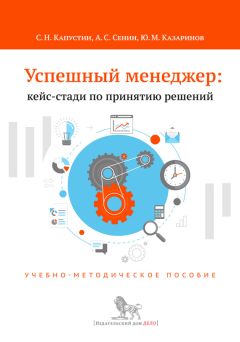Nower L. , Derevensky J. L. , Gupta R. The relationship of impulsivity, sensation seeking, coping, and substance use in youth gamblers // Psychology of Addictive Behaviors, 2004, v. 18.
O’Connor J. , Dickerson M. Impaired control over gambling in gaming machine and off-course gamblers // Addiction, 2003, v. 98 (1).
O’Connor R. E. , Yarnal B. , Dow K . et al. Feeling at risk matters: water managers and the decision to use forecast // Risk Analysis, 2005, v. 25 (5).
Osbeck L. M. Conceptual problems in the development of psychological notion of «intuition» // Journal of Theory Social Behavior, 1999, v. 29.
Pallanti S. , Quercioli L. , Sood E. , Hollander E. Lithium and valproate treatment of pathological gambling: a randomized single-blind study// Journal of Clinical Psychiatry, 2002, v. 63(7).
Pasternak A. V. Pathologic Gambling: Americas Newest Addiction?// American Family Physician, 1997, v. 56 (5).
Peck C. P. A public mental health issue: Risk-taking behavior and compulsive gambling // American Psychologist, 1986, v. 41.
Peele S. Love, sex, drugs and other magical solutions to life // Journal of Psychoactive Drugs, 1982, v. 14.
Peele S. , Brodsky A. The truth about addiction and recovery. N-Y: Fireside, 1991.
Perez de Castro I. , Ivanez A. et al. Genetic association study between pathological gambling and a functional DNA polymorphism at the D4 receptor gene // Pharmacogenetics, 1997, v. 7.
Perrow Ch. Normal Accidents: Living with High-Risk Technologies. N-Y.: Basic Books, 1984.
Peters E. M. , Burraston B. , Mertz C. K . An emotion based model of risk perception and a stigma susceptibility cognitive appraisals of emotion, affective reactivity, worldviews and risk perceptions in the generation of technological stigma // Risk Analysis, 2004, v. 24.
Peters E. , Slovich P. , Hibbarde J. H. , Tusler M. Why worry? Worry, risk perceptions and willigness to act to reduce medical errors // Health Psychology, 2006, v. 25.
Peters R. G. , Covello V. T. , McCallum D. B. The determinants of trust and credibility in environmental risk communication: an empirical study // Risk Analysis, 1997, v. 17.
Petry N. M. Pathological gamblers, with and without substance use disorders, discount delayed rewards at high rates // Journal of Abnormal Psychology, 2001, v. 110.
Petry N. M. How treatments for pathological gambling can be informed by treatments for substance use disorders // Experimental and Clinical Psychopharmacology, 2002, v. 10.
Petry N. M. , Armentano C. Prevalence, assessment and treatment of pathological gambling: A review // Psychiatric Services, 1999, v. 50 (8).
Petry N. M. , Kiluk B. D. Suicidal ideation and suicide attempts in treatment-seeking pathological gamblers // Journal of Nervous and Mental Diseases, 2002, v. 190 (7).
Pillisuk M. , Acredolo C. Fear of technological hasards: one concern or many? // Social Behaviour, 1988, v. 3.
Pillisuk M. , Parks S. H. , Hawkes G. Public perception of technological risk // Social Science Journal, 1987, v. 24 (4).
Pidgeon N. F. Safety culture and risk management in organizations // Journal of Cross-Cultural Psycholoogy, special issue: Risk and Culture, 1991, v. 22.
Pidgeon N. F. , Hood C. , Jones D. , Turner B. , Gibson R. Risk perception // Risk: Analysis, Perception and Management. London: Royal Society, 1992.
Polany M. Logic and psychology // American Psychologist, 1968, v. 23.
Pollatsek A. , Tversky A. A Theory of Risk // Journal of Mathematical Psychology, 1970, v. 7 (3).
Poortinga W. , Pidgeon N. F. Exploring the dimensionality of trust in risk regulation // Risk Amalysis, 2003, v. 23.
Poortinga W. , Pidgeon N. F. Trust in risk regulation: cause or consequence of the acceptability of GM food? // Risk Analysis, 2005, v. 25.
Potenza M. N. The neurobiology of pathological gambling // Semin. Clin. Neuropsychiatry, 2001, v. 6 (3).
Proske D. Catalogue of risks. Natural, Technical, Social and Health Risks. Springer, 2007.
Pruitt D. G. , Teger A. I. The risky shift in group betting // Journal of Experimental Social Psychology, 1969, v. 5.
Rabow J. , Fowler F. et al. The role of social norms and leadership in risk-taking // Sociometry, 1966, v. 29 (1).
Ray M. , Myers R. Practical intuition // W. H. Agor (ed.). Intuition in organization: Leading and managing productively. Newbury Park, CA, Sage, 1989.
Raynor J. O. , Smith C. P. Achivement-related motives and risk-taking in games of skill and change. Princenton University, 1965. (Цит. по: Хекхаузен Х., 2001).
Reber A. S. Implicit learning and tacit knowledge // Journal of Experimental Psychology: General, 1989, v. 118.
Regard M. , Knoch D. , Gutling E. , Landis T. Brain damage and addictive behavior: a neuropsychological and electroencephalogram investigation with pathologic gamblers // Cognitive Behaviour Neurology, 2003, v. 16 (1).
Renn O. Risk Analysis: Scope and Limitations // H. Otway, M. Peltu (eds.). Regulating Industrial Risks:
Science, Hazards and Public Protection. London, 1985.
Renn O. Risk communication and the social amplification of risk // J. Kasperson, P.-J. M. Stallen (eds.). Communicating Risk to the Public: International Perspectives. Dordrecht: Kluwer Academic Press, 1991.
Renner B. Hindsight bias after receiving self-relevant healthrisk information: a motivational perspective //
Memory, 2003, v. 11.
Reuter J. , Raedler T. , Rose M. , Hand I. , Glascher J. , Buchel C. Pathological gambling is linked to reduced activation of the mesolimbic reward system // National Neuroscience, 2005, v. 8 (2).
Richard D. E. , Petersen S. J. Perception of environmental risk related to gender, community socioeconomic settingt, age and locus of control // Journal of Environmental Education, 1998, v. 30 (1).
Richard R. , van der Pligt , De Vries N. Anticipated refret and time perspective: changing sexual risk-taking behaviour // Journal of Behavioral Decision Making, 1996, v. 9.
Richardson K . Risk news in the world of internet newsgroups // Journal of Sociolinquistics, 2001, v. 5.
Ridley D. , Young P. D. , Johnson D. E. Salience as a dimension of individual and group risk taking // Journal of Psychology: Interdisciplinary and Applied, 1981, v. 109.
Riley M. W. , Waring J. Age and aging // R. Merton, R. Nisbet (eds.). Contemporary social problems. N-Y.:
Harcourt Brace Jovanovich, 1976.
Rim Y. Risk-taking and need for achievement // Acta Psychologica, 1963, v. 21.
Rim Y . Social attitudes and risk-taking // Human relations, 1964, v. 17.
Rim Y. Who are the risk-takers in decision making? // Personnel Administration, 1966, v. 29.
Rim Y. Machiavellianism and decisions involving risk // Brit. Journal of Social and Clinical Psychology, 1966, v. 5.
Rimal R. N. , Real K. Perceived risk and efficacy belirfs as motivators of change // Human Communication Research, 2003, v. 29 (3).
Risk and Society. Studies of risk generation and reactions. Ed. By A. Sjoberg. L., 1987.
Risk-taking behaviour Concepts. Methods Applications to Smoking and Drug Abuse. Springfield: Charles Thomas Publisher, 1971.
Roney C. J. R. , Trick L. M. Grouping and gambling: A gestalt approach to understanding the gambler’s fallacy // Canadian Journal of Experimental Psychology, 2003, v. 57.
Room R. , Turner N. E. , Lalomiteanu A. Community effects of the opening of the Niagara Casino // Addiction, 1999, v. 94 (10).
Rosa E. A. Metatheoretical Foundations for Post-Normal Risk // Journal of Risk Research, 1998, v. 1.
Rosa E. A. The logical structure of the social amplification of risk framework: metatheoretical foundations and policy implications // Risk: Analysis, Perception and Management. London, 2003.
Rosenbloom T. Sensation seeking and risk taking in mortality salience // Personality and Ibdividual Differences, 2003, v. 35.
Rosenthal S. O. Risk exercise (RE). Official Publication of the United States Polo assotiation, 1968.
Rothman A. J. , Klein W. M. , Weinstein N. D. Absolute and relative biases in estimations of personal risk // Journal of Applied Social Psychology, 1996, v. 26.
Rottenstreich Y. H. , Hsee C. K. Money, kisses and electric shoks: on the affdective psychology of risk // Psychological Science, 2001.
Rotter J. C. Counseling and therapy for couples and familes // The Family Journal, 2004, v. 12 (1).
Rowe G. , Wright G. Differences in expert and lay judgments of risk: myth or reality? // Risk Analysis, 2001, v. 21.
Rowe W. D. An Anatomy of Risk. Environmental Protection Agency. Washington, 1975.
Roy A. , Custer R. , Lorenz V. et al. Personality factors and pathological gambling // Acta Psychiatry Scand., 1989.
Rundmo T. Associations between affect and risk perception // Journal of Risk Research, 2002, v. 5.
Russo A. M. , Taber J. I. , McCormick R. A . et al. An outcome study of an inpatient treatment program for pathological gamblers // Hospital and Community Psychiatry, 1984, v. 35.
Sandman P. Hazard versus outrage in the public perception of risk // V. T. Covello, D. B. McCallum, M. T. Pavlova (eds.). Effective Risk Communication. N-Y: Plenum Press, 1989.
Savage I. Demographic influences on risk perception // Risk Analysis, 1993, v. 13 (4).
Schmidt F. N. , Gifford R. A. Dispositional approach to hazard perception: preliminary development of the environmental appraisal inventory // Journal of Environmental Psychology, 1989, v. 9 (1).
Schmidt L. Fragebogen zur Erfassung verschiedener Risikobereitschaftsfactoren (FRF) / B. Bukasa, R. Rissr (Hrsg.). Die Verkehrspsycologischen Verfahren im Rahmen der Fahreignungsdiagnostik, Literas, Wien, 1985.
Schr ц der H. E. The risky shift as a general choice shift // Journal of Personality and Social Psychology, 1973, v. 27 (2).
Schumacher J. , Roth M. Sensation seeking, gesundheitsbezogene Kognitionen und Partizipation am Risikos-port // Zeitschrift fьr Gesundheitspsychologie, 2004, v. 12.
Scodel A. , Ratoosh P. , Minas J. S. Some personality correlates of decision making under condicions of risk // Behavioral Science, 1959, v. 4.
Shirley D. A. , Langan-Fox J. Intuition: A review of the literature // Psychological Reports, 1996, v. 79.
Short J. F. The Social Fabric of Risk: Towards the Social Transformation of Risk Analysis // American Sociological Review, 1984, v. 49.
Siegrist M. , Cvetkovich G. Perception of hazard: the role of social trust and knowledge // Risk Analysis, 2000, v. 20.
Siegrist M. , Keller C. , Kiers H. A new look at the psychometric paradigm of perception hazards // Risk Analysis, 2005, v. 25.
Siegrist M. , Earle T. C. , Gutscher H. , Keller C . Perception of mobile phone and base station risk // Risk Analysis, 2005, v. 25 (5).
Simon H. A. Making management decisions: The role of intuition and emotion // Acad. of Manag. Executive, 1987, v. 1.
Singer M. N. Risk Management Manual. Santa Monica, CA, 1986.
Sjoberg L. Explaining Risk Perception: An Empirical and quantitative Evaluation of Cultural Theory. RHIZIKON: Risk Research Report 22, 1995.
Sjoberg L. Consequences of perceive risk: demand for mitigation // Journal of Risk Research, 1999, v. 2.
Sjoberg L. Risk perception in Western Europe // Ambio, 1999, v. 28.
Sjoberg L. Are received risk perception models alive and well? // Risk Analysisw, 2002, v. 22.
Sjoberg L. , Drottz-Sjoberg B. M. Attitudes Toward Nuclear Waste. RHIZIKON: Risk research report 12. Sweden: Stockholm School of Economics, Center for Risk Research, 1993.
Sjoberg L. , Wahlberg A . Risk perception and new age beliefs // Risk Analysis, 2002, v. 22.
Slovic P. Informing and educating the public about risk // Risk Analysis, 1986, v. 6 (4).
Slovic P. Perception of risk from radiation / W. K. Sinclair (ed.). Radiation Protection Today. The NCRP at Sixty Years, 1990.
Slovic P. Peception of Risk // Science, 1987, v. 230.
Slovic P. Peception of Risk. London: Earthscan, 2000.
Slovic P. , Fischhoff B. , Lichtenstein S. Rating the risk // Environment, 1979, v. 21 (3).
Slovic P. , Fischhoff B. , Lichtenstein S. Characterising perceived risk // Perilous Progress: Managing the Hazards of Technology. Boulder, CO: Westview, 1985.





